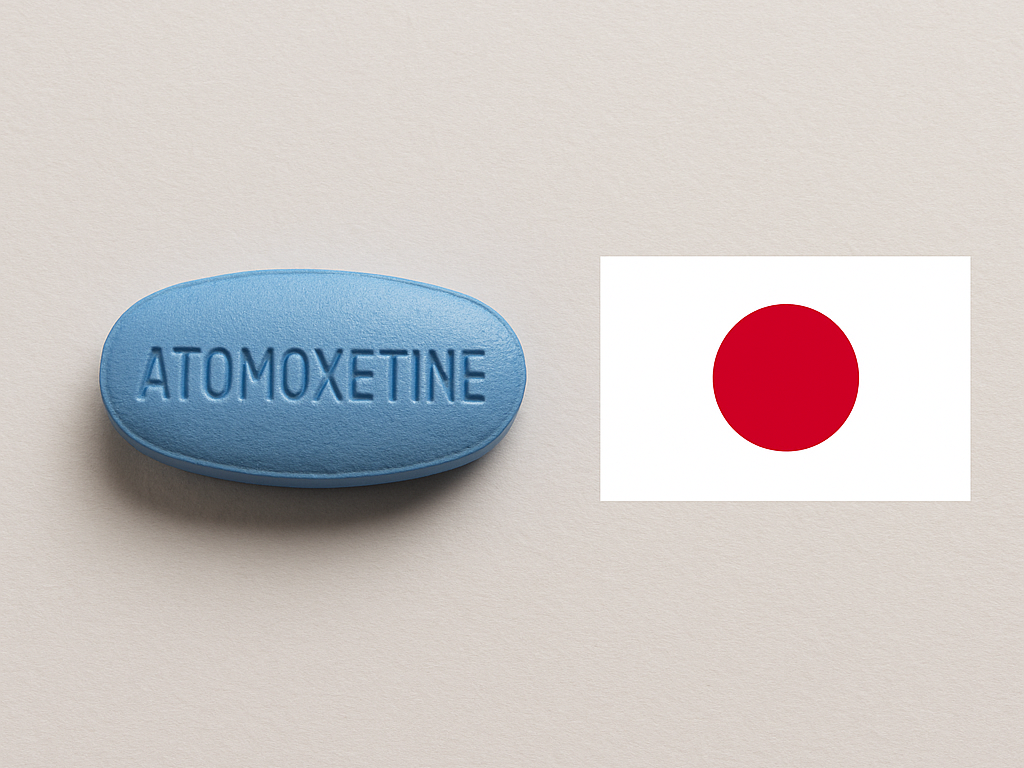In Japan, awareness of ADHD and its treatments has grown steadily over the past decade, with more children and adults being diagnosed and treated each year. While stimulant medications such as methylphenidate (Ritalin/Concerta) are strictly regulated and available under very limited conditions, atomoxetine (brand name Strattera) has emerged as an important option for Japanese patients.
If you live in Japan, are moving there, or plan to bring your prescription medication while traveling, here is what you need to know about atomoxetine’s legal and regulatory status.
Is Atomoxetine Legal in Japan?
Yes — atomoxetine is legal in Japan and approved for use as a prescription medication.
It is marketed under the brand name Strattera (ストラテラ) and is authorized by Japan’s Ministry of Health, Labour and Welfare (MHLW). Strattera was approved in Japan in 2009 for use in children and adolescents with ADHD, and later extended to include adult ADHD as well. It remains one of the few non-stimulant ADHD medications available in the country.
How Is It Regulated?
Atomoxetine is not classified as a controlled substance in Japan. Unlike stimulant-based medications such as methylphenidate (which is placed under Japan’s Narcotics and Psychotropics Control Act), atomoxetine has a lower risk of abuse or dependence and is regulated more like a standard prescription drug.
That said, atomoxetine still requires a prescription from a licensed Japanese physician. It cannot be purchased over the counter, and self-import without proper documentation can raise issues with customs.
Bringing Atomoxetine Into Japan
If you’re traveling to Japan and want to bring your prescribed atomoxetine from another country, you should follow Japan’s rules for bringing personal medication:
- You may bring up to one month’s supply of prescription medication for personal use without applying for special permission.
- If you need more than one month’s supply, you must apply for a Yakkan Shoumei (薬監証明) certificate through the Ministry of Health before your arrival.
- Always carry your original prescription and, if possible, a doctor’s letter to explain your medical need.
Customs officers have the right to inspect and verify any medication brought into the country, so proper documentation is strongly recommended.
Why Atomoxetine Is Popular in Japan
There are a few reasons why atomoxetine is commonly prescribed in Japan:
- Non-stimulant: Japan is culturally and legally cautious about stimulant use.
- Safety profile: Lower risk of dependence compared to methylphenidate.
- Approved for adults and children: Suitable across age groups.
- Availability: Readily stocked in pharmacies nationwide when prescribed.
Things to Keep in Mind
- Never attempt to buy atomoxetine from rogue online pharmacies with no customer reviews.
- If you need ADHD treatment in Japan, make an appointment with a psychiatrist or clinic experienced in adult and pediatric ADHD. Not all doctors in Japan are familiar with adult ADHD, but awareness is growing.
Alternatives to Atomoxetine in Japan (2025)
Atomoxetine (Strattera) is one of the most commonly prescribed non-stimulant medications for ADHD in Japan, but it isn’t the only option. Depending on your needs — whether you’re seeking ADHD treatment, wakefulness-promoting medication, or alternatives due to side effects — there are other medications available in Japan, though with some unique restrictions.
Here’s a breakdown of the best-known alternatives:
For ADHD: Approved Alternatives
1. Methylphenidate (Concerta)
- Status in Japan: Legal but heavily restricted.
- How it compares: A stimulant that is often more effective and faster-acting than atomoxetine. Commonly prescribed when atomoxetine is ineffective or poorly tolerated.
- Brand name: Concerta.
- Access: Requires special registration of the prescribing doctor and close monitoring under the Narcotics and Psychotropics Control Act.
- Pros:
- Very effective for ADHD symptoms.
- Longer history of use.
- Cons:
- More potential for abuse and dependence.
- Strict regulation can make access harder.
2. Clonidine / Guanfacine (Intuniv)
- Status in Japan: Approved for ADHD.
- How it compares: Non-stimulant, alpha-2 adrenergic agonist, useful especially for hyperactivity and impulsivity.
- Brand name: Intuniv (guanfacine).
- Pros:
- Lower risk of abuse.
- Can improve sleep and anxiety.
- Cons:
- Sedating for some patients.
- Slower onset of effects.
3. Bupropion (Off-label)
- Status in Japan: Approved for depression but sometimes prescribed off-label for ADHD.
- How it compares: Mild stimulant-like effects, but less studied than atomoxetine for ADHD.
- Pros:
- Improves mood and focus.
- Non-stimulant.
- Cons:
- Not officially approved for ADHD.
- Less effective for severe ADHD.
For Wakefulness & Narcolepsy: Approved Options
While atomoxetine is not a wakefulness-promoting agent, some patients look for alternatives that improve daytime alertness — here’s where modafinil comes in.
4. Modafinil
- Status in Japan: Not approved for ADHD or narcolepsy; illegal for sale and use without a special import permit.
- How it compares: A wakefulness-promoting agent (eugeroic) often used off-label for ADHD and narcolepsy in other countries.
- Pros:
- Long-lasting alertness without classic stimulant “crash.”
- Low abuse potential.
- Cons:
- Not available in Japan.
- Importing modafinil into Japan without special authorization is illegal and can result in confiscation and penalties.
If you’re looking for modafinil-like effects, Japan has no legal equivalent currently available.
Summary Table
| Question | Answer |
|---|---|
| Is atomoxetine legal in Japan? | ✅ Yes, with a prescription |
| Brand name in Japan | Strattera (ストラテラ) |
| Controlled substance? | 🚫 No |
| Over-the-counter? | 🚫 No |
| Allowed to bring when traveling? | ✅ Up to 1 month supply |
